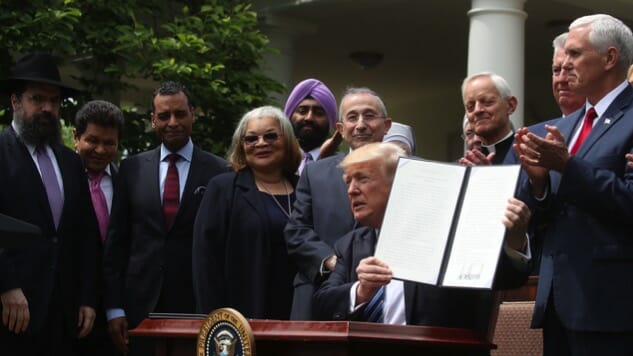What Would Jesus Executive Order? Probably Not This!
Photo by Mark Wilson
This has been a good week for doublespeak, no? The GOP controlled House passed a health care bill favoring the young over the elderly, the rich over the poor, the insurance companies over the consumers and the healthy over the sick. Andrew Jackson apparently could’ve prevented the Civil War despite dying 16 years prior to its most initial proceedings; not to mention, the causes of that conflict were opaque rather than obvious. The cherry on top: a president who spent his campaign talking about Muslim registries and bans just issued an executive order on religious freedom.
When it comes to the executive order, it’ll have more success jumpstarting conversations than actually effecting any hard-and-fast policy changes. Those discussions will be really awkward and angering too. For better or worse, this affords Americans the opportunity to talk openly and uncomfortably about the three things they’re not supposed to—religion, sex and politics—all at once. But most specifically, it allows us an opportunity to reflect on the fact the phrase “religious freedom” is now more about closing doors than opening them.
First, a little more context. It may seem like the ACLU is acting out of character by not suing Trump over this order. But there’s a pretty obvious reason for their inaction: the order doesn’t really do anything and functions more as “an elaborate photo-op” to appease evangelicals than anything else. It’s a big-budget movie trailer for something that may never happen.
The order says the Trump administration will vigorously promote religious freedom (okay, how?), that it will ignore the Johnson Amendment preventing churches, religious groups and leaders from donating to or endorsing specific political candidates (this is meaningless—all these people and groups still can’t do this, since executive orders can’t overturn court decisions or laws and there’s no attempt as of yet to get the amendment overturned in court or repealed by the legislative branch) and that it will exempt religious employers from having to provide contraception to their employees (this can’t happen because regulations can’t be overturned by executive orders either). Even National Review is calling the order “worse than useless.”
It’s just about keeping up appearances for Trump, but it’s still distressing that this kind of thing is what a great number of Pence types from sea to shining sea consider their token issue. In other words, even if this was largely about tiding over the evangelicals who helped put Trump in office, it’s disturbing to wonder why this plays to their moral sensibilities in the first place. The initial European settlers of this country sought religious freedom from persecution; a decent amount of today’s American Christians seem to primarily seek the opportunity to persecute.
“Religious liberty” and “religious freedom” have become catch-all terms for conservative evangelicals to trot out whenever they want exemption from treating any other group as equals—the usual suspects include LGBTQ people, women, the poor, other religious adherents. For a group called to serve explicitly by their Messiah—a friend to the GOP’s favorite kinds of people, like prostitutes, the impoverished, tax collectors—it’s odd that the primary religious freedom they seek from their government is the ability not to serve on the grounds of religious objection. It’s never that someone wants government subsidies or tax breaks so they can bake cakes for all their city’s homeless; it’s that someone doesn’t want to bake a cake for a gay couple. It’s never that a company wants state assistance to provide even better health care to all their employees; it’s that they don’t want to provide contraception or reproductive health care for women.
And it’s not so much about religious freedom as it is about evangelical favoritism. Irony is the right-wing media and Trump administration baselessly fear-mongering about sharia law coming to America, all while trying to enshrine and codify their own religious beliefs into a legal code binding citizens who may not hold the same beliefs.
-

-

-

-

-

-

-

-

-

-

-

-

-

-

-

-

-

-

-

-

-

-

-

-

-

-

-

-

-

-

-

-

-

-

-

-

-

-

-

-








































